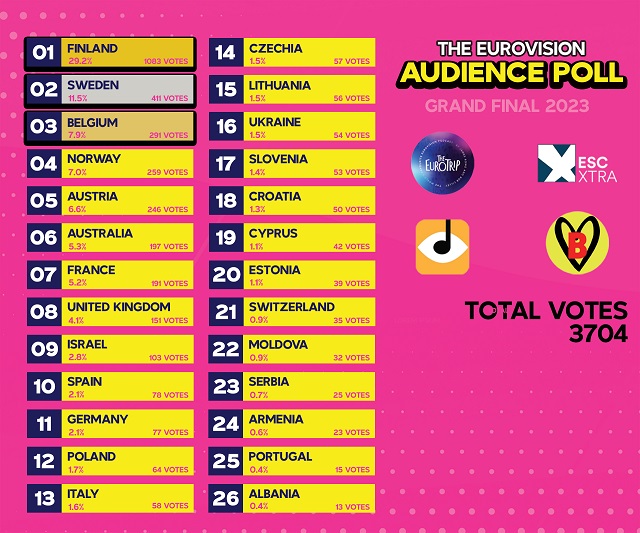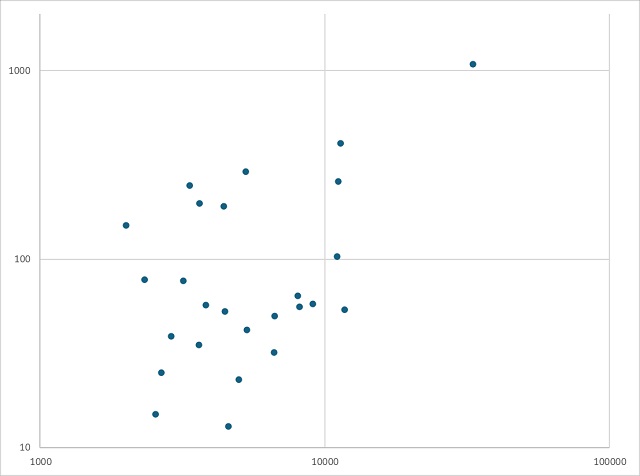Last year in Liverpool ourselves along with other Eurovision community websites decided to work together to create the Eurovision Audience Poll.
The Eurovision Audience Poll does exactly what you might get from its name, asking the audience who their favourites were after seeing the show. The show in question is the evening rehearsal, the show the night before the live broadcast, which is the first ticketed event that the general public can access.
On leaving the Liverpool Arena last year, members of the public attending the show were asked to reveal who their favourite was from the live show they had just witnessed. After polling over 2000 people each night we churned out fascinating results that fuelled the speculation, gave delegations hope, and saw Eurovision predictions being discussed by some of the most prominent political voices in the land.

Grand Final results at the 2023 Eurovision Audience Poll
But is an exit poll worth hanging around outside the arena to do? Do we learn anything new from conducting the poll? That is what we are about to find out.
The Headline Figures
First and foremost our Audience Poll did predict that last year would have a runaway winner with the public, namely ‘Cha Cha Cha’ from Finland, which picked up 41.7% of the Audience Poll votes in the Semi Final, and 29.2% of the votes in the Grand Final – more than double what any other song received. Televoting runner-up and overall winner ‘Tattoo’ from Sweden came in second behind Finland in both instances.
At the second Semi Final the Audience Poll predicted ‘Who The Hell Is Edgar’ to win the Semi Final, which ended up in second place, and that Semi Final was won by Australia’s Voyager with ‘Promise’ (placed 3rd in the Audience Poll the night before).
The Audience Poll was a decent indicator of how the Semi Final qualifiers would turn out, predicting 8 of the 10 qualifiers from the first Semi Final and second Semi Final respectively. In the first Semi Final Ireland and Malta were predicted to qualify, who ultimately were replaced by Serbia and Moldova, whereas in the second Semi Final Lithuania and Albania missed out with the Audience Poll, which had Denmark and Iceland qualifying.
The Biases of the Audience Poll
The Audience Poll concept is, I’m afraid, another example of a Swedish idea that has been inflicted on the Song Contest (and for this one am I to blame). Swedish OGAE fan club Melodifestivalklubben has accredited press at each week of the Melodifestivalen tour, and on the Friday night of that tour the fan club asks those watching the rehearsal who their favourite was in the show.
Much like at Eurovision these are exciting results. Throughout five of the six weeks of modern Melodifestivalen the poll has new songs that the press have heard, but there is no idea about if the public will love them or not. It isn’t quite so dramatic at Eurovision, but the stage show that accompanies these Eurovision numbers in their full form can make or break a song’s chance of connecting with the audience in the arena, and thereafter the audience at home.
The Melodifestivalen polls for the heats are very accurate indicators of success. Two songs qualify to the Melodifestivalen final directly each week, and at least one of those in the top two of the audience poll has always made it to the final.
The rehearsal poll at Melodifestivalen has its own biases. The audience is often family groups with plenty of children and as such the music tastes skew younger with all the kids in the audience. The rehearsal poll also appears to skew more towards the uptempo and loud, dramatic, entertaining numbers, rather than any tender ballads that take part. Furthermore home crowd advantage can also be a factor, and acts like Theoz and Anna Bergendahl have previously landslided rehearsal polls with an audience that took place in their hometown before.
I can argue that our Audience Poll at the Eurovision Song Contest had similar biases. The Audience Poll loved Belgium and Austria last year, which finished 3rd and 5th respectively in the Grand Final Audience Poll, although their televote scores were far less than this suggested.
Indeed you would need to go as far down as 10th in the Grand Final Audience Poll to have anything without a dance beat in the background, which was the position awarded to Blanca Paloma from Spain. In real life Ukraine, Italy and Albania all made the televoting top ten at the 2023 Eurovision Song Contest.
There is also an argument that, while the Audience Poll does have a wide range of general public ticket purchasers in the audience, obviously these are going to include people who have a more serious love of Eurovision than the general public. This is amplified by the fact that a significant minority of these tickets are only sold to members of the Eurovision fan club OGAE, and as such the taste of Eurovision’s biggest fan community comes through this poll much more than with the general public. One can argue that France’s high result (7th with the Grand Final Audience Poll, 14th with televoters, 3rd in OGAE Poll) and Ukraine’s low score (16th in Audience Poll, 4th with televoters, shared last place in the OGAE Poll) shows some of this bias creeping in.
However the biggest bias that likely is present is geography. The Audience Poll of course took place in Liverpool and as such the tastes that come through will represent one that does in some sense reflect upon the community watching the show. While a lot of the audience were from the local area, many Eurovision fans from around the world were always present, although these were dominated by those from Western Europe.
Anecdotally I can reveal to you that a significant number, if not the majority of, votes cast for nations such as Ireland, Malta and Ukraine came from those in Liverpool who came from those nations. The Irish and Maltese fans were out in force on the Monday night, and I recall many face-painted Irish fan deliriously telling me they wanted Ireland to win with Wild Youth. On the Friday night we were reminded that across all nine shows it is understood that 3,000 tickets were reserved for Ukrainian refugees to the United Kingdom so they would have the opportunity to experience their Eurovision Song Contest. Many of them voted for Ukraine in our exit poll.
The Mathematics of Usefulness
Twitter used dolphin_dane has investigated how useful the Audience Poll is as a proxy for the final outcome at the Song Contest. This is not an easy task to try and calculate, we know how many votes each act got in the Audience Poll, but for the televoting we don’t know how many votes each act got from each country, just their relevant rankings.
Dolphin_dane has made an approximation so that the televote winner in each nation receives 1000 points, 2nd place 500 points and soon, to bring the size of the values similar to that the Audience Poll demonstrated.
In order to make the data from the Audience Poll then best fit the actual televoting results, dolphin_dane multiplied the results from the United Kingdom televote by 10, to account for the local audience, and the other Western European nations by 3, which are nations that would more likely have their fans in the audience in Liverpool.
The coefficient factor for these three shows compared to the adaptive data is as follows:
Grand Final: +0.734
Semi Final One: +0.725
Semi Final Two: +0.170
Values over +0.7 show very high correlation. This result means that, yes, the Audience Poll does have biases in its data collection, but otherwise it suggests excellent value in being a proxy for how the televote will play out in the Song Contest.

Correlation data between the Audience Poll (y axis) and televote points received (x axis, as per dolphin_dane’s adjustments described above). Note this x axis is logarithmic in scale (Image: dolphin_dane)
However the value of +0.17 is remarkably low. This appears to be most explained for that this Semi Final was most affected by the West/East split in the Semi Final. Audience poll qualifier Denmark received only 6 televote points on the night, as non-qualifier Lithuania did actually end up in 4th place in the Semi Final. One factor here could be the UK televote, which gave twelve points to Lithuania in the Semi Final, but despite a British audience Lithuania wasn’t fabulously received on the Wednesday night.
The audience poll may therefore be a poor proxy for dealing with diaspora points, especially if that diaspora are not active in attending the Song Contest in person. The highest concentration of Lithuanians is on the eastern side of the United Kingdom and as thus wasn’t particularly prominent in Liverpool.
Will Malmö Be Different?
The plans are that volunteers from various Eurovision sites, as well as OGAE Sweden, will be helping to conduct the poll this year in Malmö. The plan is that we will conduct the poll in roughly the same way as previously, asking those leaving the Malmö Arena on the Monday, Wednesday and Friday evenings the question “Who was your favourite tonight?” The only notable difference in data collection is that, as the Big 5 and host country will take part drawn alongside the competing Semi Finalists in the broadcast, we will accept answers for those nations if members of the public say them (though recording any answers separate to the acts competing.
What biases exist extra in Malmö? Obviously we are aware that Sweden as the host country may do well, and one may assume that Denmark will be overrepresented on the ground with the Malmö Arena being a stone’s throw from the centre of Copenhagen. Note too that it sounds like Joost’s fan base has also mobilised itself to be in town, and the third highest nation buying tickets for the Grand Final is the Netherlands.
Also note as well that Malmö is a well known multicultural town, with over half of all residents with at least one foreign born parent. Of the population in Malmö that is foreign born away from Sweden, outwith Denmark note there could be bias from other demographics, with a significant number born in former Yugoslavia and Poland living in Malmö amongst other nationalities.
Soon enough we will find out which acts go down best with the audience in the arena. The results of the Audience Poll will be published by ESC Insight roughly one hour after each rehearsal has finished on our social media, and that of all the other sites, ESCXtra, The Euro Trip Podcast and Melodifestivalklubben (OGAE Sweden).
eurovisionaudiencepoll.com is also available for all the results.









